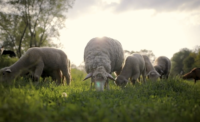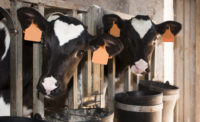Making the case for labelling transparency

For most consumers, label wording such as “grass-fed “or “pasture-raised” conjures images of humanely raised livestock lazily feeding in a rustic barnyard, but that’s not necessarily the case.
Leeway in labelling claims granted to food marketers under federal labelling regulations sometimes results in consumers not getting a clear picture of how animals were raised and the product was made.
Pederson's Natural Farms’ Vice President Neil Dudley said Pederson’s Natural Farms sees package labeling as an ideal venue to inform shoppers about the company’s products and how they’re produced, including treatment of their animals. However, he added that in his view not every company labels its food with the same clarity in mind, aware that what they put on their label might create an image that isn’t completely accurate.
With bringing some clarity to labelling claims in mind, Dudley recently hosted panelists in a discussion as part of Pederson's Natural Farms’ Working Better To Do Better ongoing series of free webinars, where Pederson's Natural Farms seeks to bring transparency to food industry practices and claims.
Take “pasture raised,” for example.
The U.S. Department of Agriculture’s Food Safety Inspection Service doesn’t have specific guidelines for the meaning of the term and instead asks that companies’ labeling define what they mean by using the wording (with supporting documentation for FSIS to verify the claims), said panelist Kristin McNeely, who specializes in animal-raising claims with labeling at USDA.
Dudley said that example is a perfect illustration of the reality that companies face when crafting labeling claims. USDA is in charge of evaluating “pasture raised” claims on product labels, but there isn’t a written standard but rather a rule that says if a company is going to use the wording it must define what it means on the label so consumers can understand it.
There’s a lot of gray area and it’s species-specific, said panelist Lance Avery, owner of Chicago-based Big Fork Brands, a family-owned company that markets bacon sausage, flexitarian sausage, craft pork jerky and pork snack sticks. Big Fork Brands sources meat from small family farmers in Iowa who raise heritage hogs outdoors without the use of antibiotics.
“Uncured” is another term that can easily be misunderstood by consumers.
“Uncured” must be used on labeling for products that normally would be required to use FSIS-specified curing agents such as nitrites, McNeely said.
Sounds clear enough, but Dudley said the issue is clouded when consumers look for information on “uncured” products on the Internet and find sources claiming it means sugar free or smoked.
“Humanely raised” is another term not regulated by FSIS, requiring it to be defined on the label and supported with documentation, McNeely said
“Everyone under the sun has a different opinion on it,” Avery said of how marketers seek to define “humanely raised.”
He said he avoids using the term because of the legal gray areas surrounding it, adding that in his experience it’s best to stick with facts and avoid emotion-based claims.
“We don’t just blindly approve any definition,” McNeely said. “It has to be truthful and not misleading.”
The next webinar in the series (scheduled for 3 p.m. CST on May 4) will be about how consumer buying of value-added products like humanely raised and grass-fed is trending upward.
Looking for a reprint of this article?
From high-res PDFs to custom plaques, order your copy today!
.png?height=96&t=1647275041&width=96)





